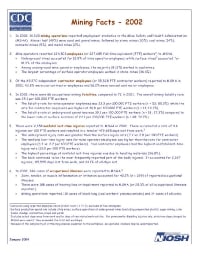Mining Publication: Mining Facts - 2002
Original creation date: January 2004
Authors: National Institute for Occupational Safety and Health
In 2002, 14,520 mining operations reported employment statistics to the Mine Safety and Health Administration (MSHA). Almost half (49%) were sand and gravel mines, followed by stone mines (30%), coal mines (14%), nonmetal mines (5%), and metal mines (2%). Mine operators reported 224,803 employees (or 227,685 full-time equivalent (FTE) workers) to MSHA. Of the 69,270 independent contractor employees (or 35,328 FTE contractor workers) reported to MSHA in 2002, 43.8% were coal contractor employees and 56.2% were noncoal contractor employees. In 2002, there were 66 occupational mining fatalities, compared to 72 in 2001. The overall mining fatality rate was 25.1 per 100,000 FTE workers. There were 9,358 nonfatal lost-time injuries reported to MSHA in 2002. These occurred at a rate of 3.6 injuries per 100 FTE workers and resulted in a total of 479,655 days lost from work. In 2002, 744 cases of occupational illnesses were reported to MSHA.

- Coal and metal/nonmetal mining facts - 2008
- Coal and Metal/Nonmetal Mining Facts - 2008 (HTML)
- Coal Contractor Mining Facts - 2001
- Coal Contractor Mining Facts - 2002
- Coal Contractor Mining Facts - 2003
- Coal Contractor Mining Facts - 2004
- Coal Contractor Mining Facts - 2005
- Coal Contractor Mining Facts - 2006
- Mining Fact Sheets
- Rib Falls: A Major Ground Control Issue